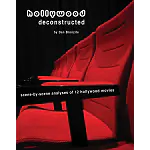Tag: movie script
Humor in a Dark Place
The world we live in isn’t perfect and to be honest, although every day we all strive for perfection in one way or another, our lives would probably be…
Don’t Get Stuck on an Unresolved Plot Point
Writers’ Block — It’s a killer We’ve all been there, happily tapping away at the keyboard at our latest and greatest movie script in a creative stream of consciousness…
Vary your Movie Script Locations
In your everyday life, do you sit in one spot and talk to everybody you meet in that same place? Okay, maybe you do but unless that’s the point…



